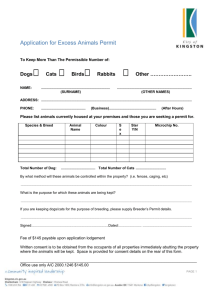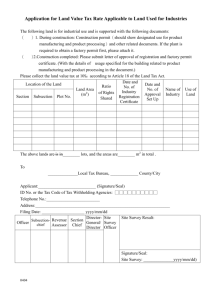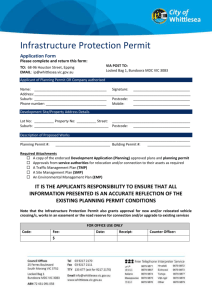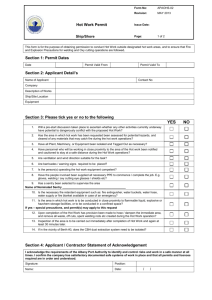Guideline Template DME - Northern Territory Government
advertisement
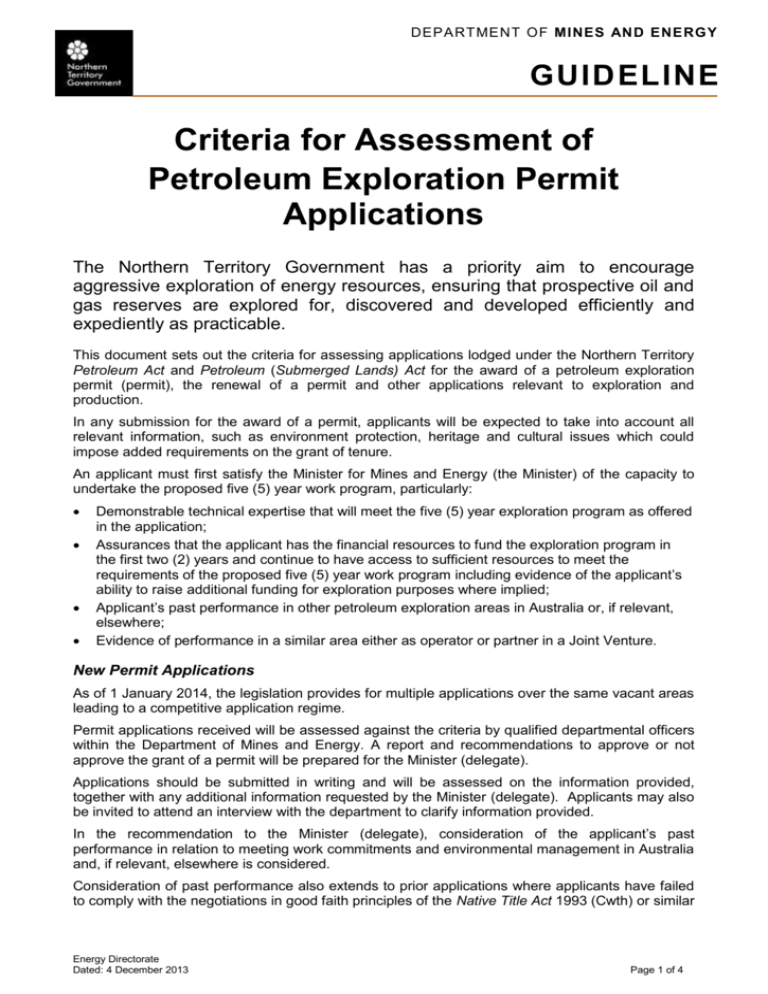
DEPART MENT OF MINES AND ENERGY GUIDELINE Criteria for Assessment of Petroleum Exploration Permit Applications The Northern Territory Government has a priority aim to encourage aggressive exploration of energy resources, ensuring that prospective oil and gas reserves are explored for, discovered and developed efficiently and expediently as practicable. This document sets out the criteria for assessing applications lodged under the Northern Territory Petroleum Act and Petroleum (Submerged Lands) Act for the award of a petroleum exploration permit (permit), the renewal of a permit and other applications relevant to exploration and production. In any submission for the award of a permit, applicants will be expected to take into account all relevant information, such as environment protection, heritage and cultural issues which could impose added requirements on the grant of tenure. An applicant must first satisfy the Minister for Mines and Energy (the Minister) of the capacity to undertake the proposed five (5) year work program, particularly: Demonstrable technical expertise that will meet the five (5) year exploration program as offered in the application; Assurances that the applicant has the financial resources to fund the exploration program in the first two (2) years and continue to have access to sufficient resources to meet the requirements of the proposed five (5) year work program including evidence of the applicant’s ability to raise additional funding for exploration purposes where implied; Applicant’s past performance in other petroleum exploration areas in Australia or, if relevant, elsewhere; Evidence of performance in a similar area either as operator or partner in a Joint Venture. New Permit Applications As of 1 January 2014, the legislation provides for multiple applications over the same vacant areas leading to a competitive application regime. Permit applications received will be assessed against the criteria by qualified departmental officers within the Department of Mines and Energy. A report and recommendations to approve or not approve the grant of a permit will be prepared for the Minister (delegate). Applications should be submitted in writing and will be assessed on the information provided, together with any additional information requested by the Minister (delegate). Applicants may also be invited to attend an interview with the department to clarify information provided. In the recommendation to the Minister (delegate), consideration of the applicant’s past performance in relation to meeting work commitments and environmental management in Australia and, if relevant, elsewhere is considered. Consideration of past performance also extends to prior applications where applicants have failed to comply with the negotiations in good faith principles of the Native Title Act 1993 (Cwth) or similar Energy Directorate Dated: 4 December 2013 Page 1 of 4 negotiations under the Aboriginal Land Rights (NT) Act (Cwth) or other reasons as to why past applications have not been successful. Compliance with previous reporting and data submission requirements will also be considered. Whilst assessments will take into consideration the prospectivity of an area (highly prospective or green field) the minimum guaranteed work program value (years one and two) cannot be reduced once the permit has been awarded. Work programs proposed must significantly advance the exploration status of the area with the aim to develop that resource as soon as possible. When assessing an application, the following will be taken into account; but does not exclude other requirements. Financial resources and technical expertise to execute the full five (5) years of proposed exploration and development activities; The extent of which the applicant’s technical assessment supports the level of seismic surveying and the number of conceptual targets of wells proposed in the application; The amount, type and timing of seismic surveying or equivalent activity to be carried out and/or accessing existing non-exclusive seismic data; The number and timing of wells to be drilled, provided there is an adequate supporting program of geological and geophysical work; Expenditure, realistic and relevant to exploration activities and relevant to the prospectiveness of the area; Other surveying, data acquisition and reprocessing to be carried out; Pre-purchased, non-exclusive seismic data will not form part of the work program, but any interpretation of that data will be taken into account in assessing the merits of the work; Significant appraisal works over any previous petroleum discoveries within the area; Past exploration performance history; and Applicant’s engagement of local employment and or community, including Indigenous employment. In summary, a minimum acceptable work program should include (but not be limited to) the following: Years 1 - 2 substantial geophysical (seismic, magneto-telluric, gravity or magnetic) exploration activity, either aerial or ground; Year 3 - more extensive seismic that leads to drilling a well/wells – including a well; Year 4 - Exploration/appraisal drilling of well/wells; Year 5 - Geological analysis to firm up; identify prospective areas of the tenure for consideration of detailed assessment, pilot-production, production, tenure renewal and or relinquishment of land area. Upon grant, titleholders must undertake each component of the work program in the permit area(s) within the prescribed year If a titleholder has more than one permit (non-contiguous), expenditure in one permit cannot be substituted for expenditure in another unless it can be proven that the program to expedite exploration will benefit both areas. Proposed work commitment expenditure must be spent within each permit as indicated in the initial work program. Failure to complete the work program commitments especially on the minimum guaranteed first two (2) years may result in the commencement of permit cancellation proceedings and will impact on the considerations for renewal of tenure, waiver applications, suspension of work program applications etc. Failure to observe requirements for timely submission of data, including annual reports to Northern Territory Geological Survey is also to be taken into consideration. Energy Directorate Dated: 4 December 2013 Page 2 of 4 Permit Renewal An application for renewal of a permit is required to be submitted to the Minister (delegate) no earlier than six (6) months, but no later than three (3) months before the expiration of the permit. The Minister (delegate) may not renew the permit more than twice. The Minister’s (delegate) approval is required for late renewal applications and must be obtained before the three (3) month expiry timeframe date. Failure to submit a renewal application within that timeframe may result in full surrender of the permit area. A renewal application must include a comprehensive report of the previous five (5) year work commitment program, findings and results. Additionally, the application is to include the proposed work program towards development for each year of the renewal term and a report on the strategic exploration plan going forward. Fifty per cent (50%) of the acreage is required to be relinquished upon renewal and a tenure map showing proposed relinquishment blocks should be submitted with the renewal application. An exemption to relinquish blocks may be granted (for 12 months) if the titleholder/s can provide significant evidence as to the reasons why they should retain the additional acreage for an additional 12 months after renewal. Permit renewal of more than 50% of existing tenure or acceptance of waiver to reduce tenure is not guaranteed. Altering Work Programs –Variation, Suspension, Extension, Wavier Alterations to work programs of Permits An application to suspend, extend, waiver or vary permit conditions is required to be submitted within three (3) months prior to expiry of the current work program year. Applications will be considered on a case by case basis; however the first two (2) years of a work program must be satisfied. For the purpose of work program alterations and where a Permittee holds a number of permits, each permit is to be considered as a separate entity. o Variation All variations are subject to the discretion of the Department of Mines and Energy and are considered on a case by case basis. Work program values cannot be reduced. In general, wells will not be permitted to be substituted by other work (e.g. seismic). A presentation to the Department on any type of variation to the work program is encouraged. Work programs may be accelerated at any time, (expenditures cannot be advanced to the following year) however prior notification is required. Circumstances where a variation application may be considered by the Department of Mines and Energy are as follows: Alternative work program is similar to or of a superior technique and meets or exceeds the objective of the original commitment; There is substantial and compelling evidence that the work program should be varied on technical grounds and the Permittee may renegotiate the entire secondary term prior to entering Year 3 or prior to entering any of the years after the secondary term. o Suspension A suspension application will only apply to the term of the active year of the permit. Commercial circumstances that are common risks in the industry would not normally be considered; for example, changes in oil prices, difficulty attracting farm-ins, avoidable delays in contracting a rig and or disappointing drilling results. Also, it is not acceptable for a permittee to expect a suspension if a decision is made to undertake new seismic surveying (additional to the Energy Directorate Dated: 4 December 2013 Page 3 of 4 current work program). This type of activity is commercially driven and should be considered in the initial work program or through a variation application. During suspension the Department of Mines and Energy will require regular reporting on the progress of activities. Suspensions do not exceed one (1) year. o Extension Extension of a permit (beyond normal term of 5 years) will not be considered unless substantial work has been carried out in previous years and there is demonstrated technical evidence for the application and a strategic plan transitional to moving forward to development. Extensions do not exceed one (1) year. o Waiver Waiver of mandatory 50% permit relinquishment will only be considered if the title holder can demonstrate previous aggressive exploration that has indicated resources exist over all designated areas and will require ‘retention’ of these areas until the full or less potential is established. End. Energy Directorate Dated: 4 December 2013 Page 4 of 4

